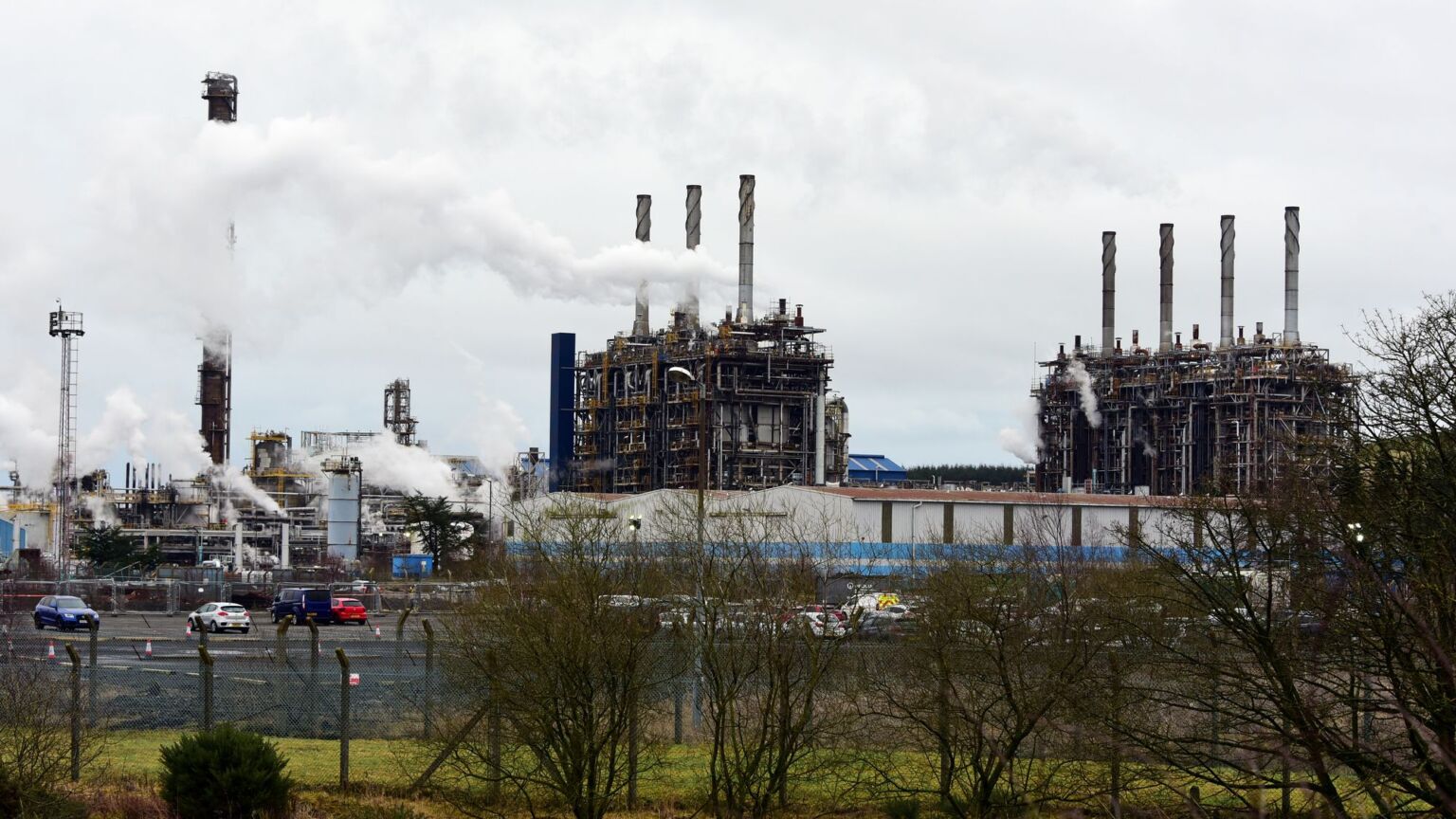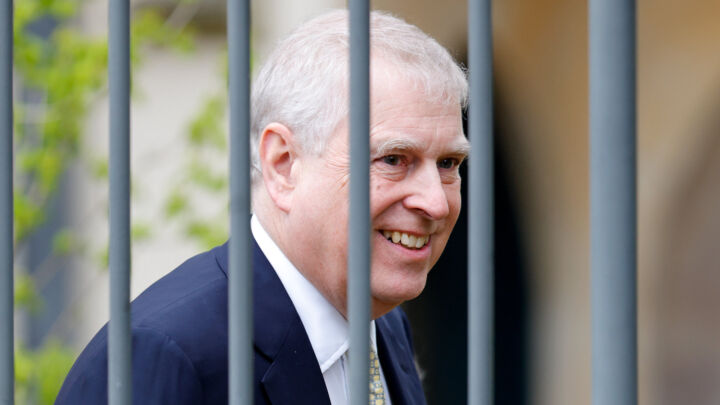Britain’s Net Zero nightmare is destroying heavy industry
Labour is blind to the devastating consequences of its environmental zealotry.

Want unlimited, ad-free access? Become a spiked supporter.
Another week, another chunk of the UK’s heavy industry disappears. On Tuesday, ExxonMobil announced the closure of the Fife Ethylene Plant at Mossmorran in Fife, Scotland, which will shut its doors in February next year. This week, the UK government confirmed there would be no bailout for the plant, just ‘support’ for the hundreds of soon-to-be redundant workers. While global trading conditions have played their part, the reason that British plants keep closing is really down to one thing: our obsession with reaching Net Zero.
Mossmorran produces ethylene, a basic feedstock for the production of plastics. Gas is piped from the North Sea to the plant, where it is heated to 700 degrees Celsius, then compressed and cooled before passing through distillation towers to separate off the ethylene. (ExxonMobil has helpfully provided a cute video explaining the process). When you string ethylene molecules into chains, you get polyethylene, which has all sorts of uses – including plastic bags and bottles, consumer goods, cable coverings and medical equipment. The world uses a lot of plastic, and polyethylene is the most common type because of its versatility.
Mossmorran opened 40 years ago and has been described by ExxonMobil as a ‘cornerstone’ of its European operations. So why is it closing now? In a statement, the company said it had looked at selling the plant, ‘but the UK’s current economic and policy environment, combined with market conditions, high supply costs and plant efficiency, do not create a competitive future for the site… Its closure reflects the challenges of operating in a policy environment that is accelerating the exit of vital industries, domestic manufacturing, and the high-value jobs they provide.’
The closure of Mossmorran comes after the even more devastating closure of Scotland’s only crude oil refinery at Grangemouth, announced in September last year. Production of ethanol at Grangemouth, another big employer, has also been stopped.
The ‘economic environment’ is feeble growth in Europe’s major economies, including the UK, France and Germany. More broadly, the world has built too many ethylene plants for the demand that exists. Last year, analysts Wood Mackenzie suggested that 24 per cent of global production plants could be at ‘some risk of closure’, particularly in western Europe. Expensive European plants are facing stiff competition from lower-cost producers elsewhere. In China, a major customer for ethylene, a shift to new, bigger plants and a greater concern about self-sufficiency is cutting demand for imports. With the war in Ukraine meaning that the EU is losing access to Russian gas – which will be sold elsewhere at lower prices – it is clear that there are undoubtedly pressures that have nothing to do with UK circumstances.
But what about the ‘policy environment’? For one thing, the supply of ethane from the North Sea is declining, not helped by the current Labour government’s decision to prevent new production there. So the huge amount of raw material – natural gas – required for the plant is now in question. Moreover, all that piping, heating and cooling requires an awful lot of energy. Thanks to climate-change policies, including carbon taxes and subsidies for renewables, that energy has been getting more and more expensive.
As the energy commentator David Turver noted in October, reflecting on the recent figures from the International Energy Agency (IEA):
‘UK industrial electricity prices at 26.63p/kWh are the highest of the 25 countries reporting data to the IEA… UK prices are three-and-a-half times more than Canada, which has the cheapest industrial electricity prices at 7.43p/kWh. Our prices are also 2.4 times those of Korea and 63 per cent higher than the IEA median.’
Who would have thought that shifting the UK to highly subsidised, intermittent renewables that require a whole extra energy infrastructure based on gas as back-up, would make heavy industry uneconomic? Just about anybody who was paying attention and wasn’t ideologically wedded to Net Zero policies.
Some other countries, like Germany, may have similarly barmy energy policies. But at least they recognise the importance of energy-intensive industry, and support it with policies that keep costs down somewhat for the really big energy users.
For the kindergarten-level response to the closure, we turn to Green MSP Mark Ruskell: ‘ExxonMobil has reported eye-watering profits and now it is cutting and running and abandoning workers. This is exactly what happens when you leave Scotland’s green industrial future in the hands of multi-millionaire owners of fossil fuel companies rather than bringing workers and trade unions to the table.’ That’s right, it’s greedy corporations who are to blame, rather than the policies that Ruskell and his chums (across the political spectrum, to be fair) have been advocating for. The Mossmorran plant was losing a million pounds per week. More investment could have helped, but no company would be mad enough to throw good money after bad when Net Zero policies made running the plant so expensive.
The only explanation even madder than ‘greedy corporations’ is the suggestion that it’s all down to Brexit – even though ExxonMobil is currently selling or closing almost all its European chemicals operations because they’ve become too damn expensive. Another chemicals giant, Dow, is shutting three plants in Germany and one in Barry, Wales. Other chemicals companies are going the same way.
The impact of this trend on the UK economy has been awful. While some sectors, like services, have grown a bit or, like manufacturing, have declined a bit, the chemicals sector is facing a rout. Ed Conway of Sky News has been raising the alarm about this for at least a year. The output of the UK chemicals industry has fallen by over a third in just three years – and that figure was before the Mossmorran announcement.
Nor is it just chemicals. We’ve already seen the closure of blast furnaces at Port Talbot in Wales. The Scunthorpe steel plant may have been rescued, but how long before Labour realises that environmental and energy policies make it too expensive to continue there, too?
Both the Conservatives and Labour must take responsibility for this. There have been endless warnings about the impact of higher energy costs and other environmental policies on the economy. But Labour is in power now, yet ploughs on, despite the devastation. How much more damage must be done before we scrap these terrible policies?
Rob Lyons is the author of a new paper, The Price of Prohibition: How the Tobacco and Vapes Bill could trigger a bigger black market, more retail crime, and violent turf wars, published by the smokers’ rights group, Forest.
You’ve hit your monthly free article limit.
Support spiked and get unlimited access.
Support spiked and get unlimited access
spiked is funded by readers like you. Only 0.1% of regular readers currently support us. If just 1% did, we could grow our team and step up the fight for free speech and democracy.
Become a spiked supporter and enjoy unlimited, ad-free access, bonus content and exclusive events – while helping to keep independent journalism alive.
Monthly support makes the biggest difference. Thank you.










Comments
Want to join the conversation?
Only spiked supporters and patrons, who donate regularly to us, can comment on our articles.